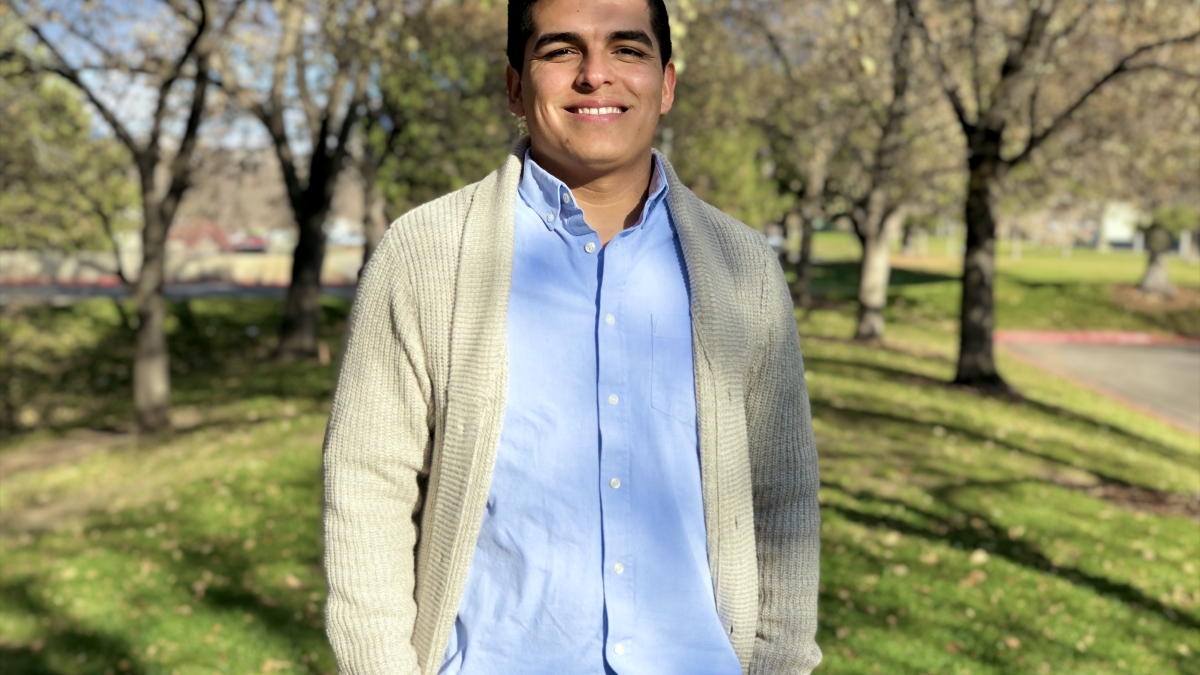Active-duty military student and religious studies grad named a fall 2020 Dean’s Medalist

Undergraduate Aaron Garcia is the recipient of the Dean's Medal from the School of Historical, Philosophical and Religious Studies.
Editor's note: This story is part of a series of profiles of notable fall 2020 graduates.
Aaron E. Garcia knew he wanted to obtain a higher education from a young age. After he and his family immigrated to the United States, his father would take him to work to help install tile.
“He would always tell me the same thing when I was exhausted and drained, ‘If you don’t want to do this for the rest of your life, go to school,’” said Garcia. “Fast forward to 2017, I joined the U.S. Air Force and was introduced to a chaplain during my first week of basic military training.”
He decided he wanted to work toward becoming a chaplain himself and researched what he needed to do to make that dream a reality. A master’s degree in divinity is a requirement for the position, so he chose to pursue a degree in religious studies with a concentration in religion, culture and public life from the School of Historical, Philosophical and Religious Studies and a degree in political science from the School of Politics and Global Studies.
As an active-duty military member and full-time student, Garcia often felt he should put his education on hold. This felt especially true for him while he was deployed in Afghanistan. But he didn’t let these obstacles stop him.
“I have a goal and there is nothing that will slow me down to achieve it,” said Garcia.
Garcia earned the Arizona State University Military Active Duty and Reservist Scholarship and is the recipient of the Dean’s Medal from the School of Historical, Philosophical and Religious Studies. We caught up with him to ask him about his time at ASU.
Question: What was your “aha” moment, when you realized you wanted to study the field you majored in?
Answer: My family has always been religious, and it is something that has stayed with me from a young age. I have served a two-year mission for my church and have always felt a desire to help others in any way I can. This is why serving in the U.S. military was such an easy step for me. The purpose of a chaplain is to serve others and it is something that spoke to me since day one. Once I knew that I wanted to pursue that specific career, I knew what I needed to do. This is when I realized I wanted to study the field I am majoring in.
Q: What’s something you learned while at ASU — in the classroom or otherwise — that surprised you or changed your perspective?
A: Something I understood at a greater depth while at ASU was the ability for someone to have their own opinion, even if it goes against popular belief. Being able to be so wrong, yet so right at the same time.
Q: Why did you choose ASU?
A: I chose ASU because of the diverse set of ideas I would encounter during my time at the university. Many would feel comfortable surrounded by people that think as they do. At ASU, I wanted the challenge and the experience of a diverse perspective from people with different backgrounds.
Q: Which professor taught you the most important lesson while at ASU?
A: The professor that taught me a valuable lesson while at ASU was Charles Barfoot. He taught me that I should be an agent of my education.
Q: What’s the best piece of advice you’d give to those still in school?
A: The best advice I can give to those still in school is to aim high and be willing to do what most think is impossible.
Q: What was your favorite spot for power studying?
A: As an online student, my favorite spot to power study was near my family.
Q: What are your plans after graduation?
A: My plan after graduation is to apply to the Master of Divinity program at Grand Canyon University. After that, I would like to commission and become an officer in the U.S. Air Force.
Q: If someone gave you $40 million to solve one problem on our planet, what would you tackle?
A: With $40 million, I would travel to my hometown in Mexico and build proper facilities for all children to have a quality education. With that money, I would also set up meal programs that will enable students of all ages to focus on school and less on their empty stomachs. This money will also be used for infrastructure, as there are many paths in the city that are currently dirt roads.
More Law, journalism and politics
Can elections results be counted quickly yet reliably?
Election results that are released as quickly as the public demands but are reliable enough to earn wide acceptance may not…
Spring break trip to Hawaiʻi provides insight into Indigenous law
A group of Arizona State University law students spent a week in Hawaiʻi for spring break. And while they did take in some of the…

LA journalists and officials gather to connect and salute fire coverage
Recognition of Los Angeles-area media coverage of the region’s January wildfires was the primary message as hundreds gathered at…

